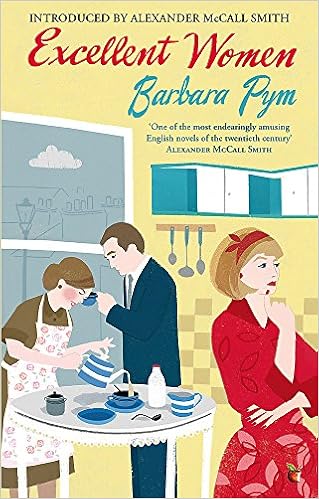Excellent Women by Barbara Pym
Given that Barbara Pym was a fairly prolific and successful writer in the mid-20th century, I don't know why I'd never read any of her books before - and after reading Excellent Women, I'll definitely read some more.
 Excellent Women is, on the surface, a middle-class comedy of manners - but I think it's a lot more than that. It's not, for instance, as gentle as you might believe - there are some sharp observations, particularly when it comes to women's societal roles. The narrator, Mildred Lathbury, is a spinster in her 30s who lives in a London flat with a shared bathroom, works part-time at a charity for impoverished gentlewomen (partly because she fears she may one day become one), and volunteers at her local church, where she is also good friends with the vicar, Julian Malory, and his sister Winifred.
Excellent Women is, on the surface, a middle-class comedy of manners - but I think it's a lot more than that. It's not, for instance, as gentle as you might believe - there are some sharp observations, particularly when it comes to women's societal roles. The narrator, Mildred Lathbury, is a spinster in her 30s who lives in a London flat with a shared bathroom, works part-time at a charity for impoverished gentlewomen (partly because she fears she may one day become one), and volunteers at her local church, where she is also good friends with the vicar, Julian Malory, and his sister Winifred.
Mildred herself is well aware that she is considered an 'excellent woman' - one of those women who aren't married but devote themselves reliably to supporting others in a way that is frequently taken advantage of (upon providing refreshments to friends going through a relationship crisis Mildred wonders herself if she is to be caught with a teapot in her hand on every dramatic occasion). At the start of the book, Mildred's quiet life is interrupted by the arrival in the flat above hers of Helena and Rockingham Napier. Helena is a bohemian, trouser-wearing anthropologist with no time for domesticity, while Rocky is a handsome naval officer, and their relationship is a tempestuous one. Mildred, as always, finds herself playing the role of a trusted and sympathetic listener - a role that becomes increasingly complicated when she finds herself developing a strong attraction to the caddish Rocky.
 Excellent Women is, on the surface, a middle-class comedy of manners - but I think it's a lot more than that. It's not, for instance, as gentle as you might believe - there are some sharp observations, particularly when it comes to women's societal roles. The narrator, Mildred Lathbury, is a spinster in her 30s who lives in a London flat with a shared bathroom, works part-time at a charity for impoverished gentlewomen (partly because she fears she may one day become one), and volunteers at her local church, where she is also good friends with the vicar, Julian Malory, and his sister Winifred.
Excellent Women is, on the surface, a middle-class comedy of manners - but I think it's a lot more than that. It's not, for instance, as gentle as you might believe - there are some sharp observations, particularly when it comes to women's societal roles. The narrator, Mildred Lathbury, is a spinster in her 30s who lives in a London flat with a shared bathroom, works part-time at a charity for impoverished gentlewomen (partly because she fears she may one day become one), and volunteers at her local church, where she is also good friends with the vicar, Julian Malory, and his sister Winifred.Mildred herself is well aware that she is considered an 'excellent woman' - one of those women who aren't married but devote themselves reliably to supporting others in a way that is frequently taken advantage of (upon providing refreshments to friends going through a relationship crisis Mildred wonders herself if she is to be caught with a teapot in her hand on every dramatic occasion). At the start of the book, Mildred's quiet life is interrupted by the arrival in the flat above hers of Helena and Rockingham Napier. Helena is a bohemian, trouser-wearing anthropologist with no time for domesticity, while Rocky is a handsome naval officer, and their relationship is a tempestuous one. Mildred, as always, finds herself playing the role of a trusted and sympathetic listener - a role that becomes increasingly complicated when she finds herself developing a strong attraction to the caddish Rocky.
There were so many things I loved about this book, but one of my favourite things about it is Mildred's astute self-awareness. She knows, for example, when she's being taken advantage of, and she knows that Rocky Napier is a womanising charmer with whom any relationship would be utterly impossible. Also, crucially, despite her 'excellent woman' status as a solid and supportive helper, always on the sidelines of the action offering tea or making up the spare bed, she is not a pushover. Nor is she lonely - she's horrified at the idea of having a flatmate, for instance, and while she'll happily holiday with her old schoolfriend Dora, she's relieved they no longer live together. Mildred is dry, witty and self-deprecating in a way I found deeply endearing.
This is a book that's much more about character than plot - there are no major dramas or twists and the action, such as it is, takes place on a small scale in a small world. But the characters themselves are such brilliant, recognisable creations and the prose so funny, sharp and observant that I absolutely wouldn't have cared if nothing had happened at all.
Comments
Post a Comment